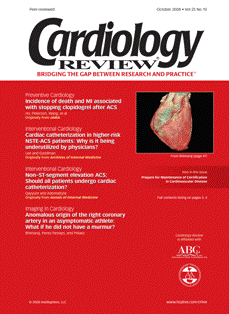Publication
Article
Cardiology Review® Online
An early recurrent cardiovascular event after stopping clopidogrel
A 70-year-old man with a history of hypertension and hyperlipidemia was admitted to the hospital with a non–ST-segment elevation myocardial infarction (MI).
A 70-year-old man with a history of hypertension and hyperlipidemia was admitted to the hospital with a non—ST-segment elevation myocardial infarction (MI). The patient was
initially treated with aspirin, metoprolol (Lopressor, Toprol XL), intravenous unfractionated heparin, and glycoprotein IIb/IIIa inhibitors, and he remained hemodynamically stable. On hospital day 2, he underwent diagnostic coronary angiography, revealing a 90% proximal circumflex stenosis in a large coronary artery with normal left ventricular systolic function. He had nonobstructive coronary artery disease in the proximal left anterior descending coronary artery (~40%-50%) and the mid right coronary artery (~60%). The patient underwent successful stenting of the circumflex lesion with a baremetal stent. He was discharged on aspirin, clopidogrel (Plavix), metoprolol, lisinopril (Prinivil), and simvastatin (Zocor), all of which were prescribed indefinitely, except clopidogrel, which was prescribed for a 12-month course.
At 1-year follow-up, the patient was doing well from a cardiac standpoint. He reported taking his medications regularly without problems and walked 1 mile each day without experiencing angina or shortness of breath. His cardiac examination was unremarkable. The cardiologist recommended stopping clopidogrel because the patient had completed his 12-month course.
Two weeks later, the patient awoke with substernal chest pain, similar to the pain he experienced during his initial MI. He took 3 nitroglycerin sublingual tablets at home and was taken by ambulance to the hospital. Anterior ST-segment elevation was observed on the patient’s presenting electrocardiogram, and he was taken immediately to the cardiac catheterization laboratory.
This case highlights the clinical scenario of early recurrent cardiovascular events after stopping clopidogrel. In this particular case, the recurrent event may be related to plaque rupture of a nonobstructive coronary lesion or due to a hyperthrombotic state after clopidogrel cessation. Additional studies are urgently needed to help identify the pathophysiology of early adverse cardiac events after stopping clopidogrel and identify
the best strategies to attenuate this effect.






